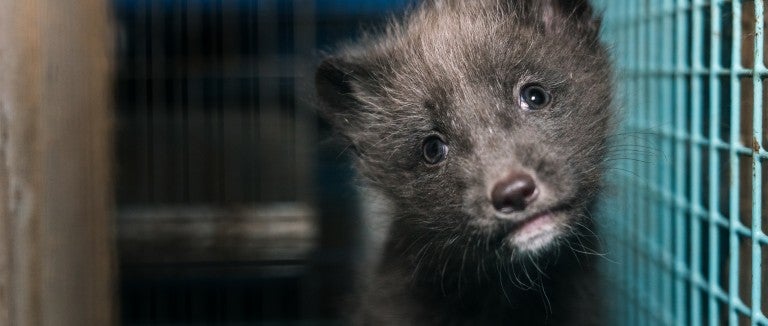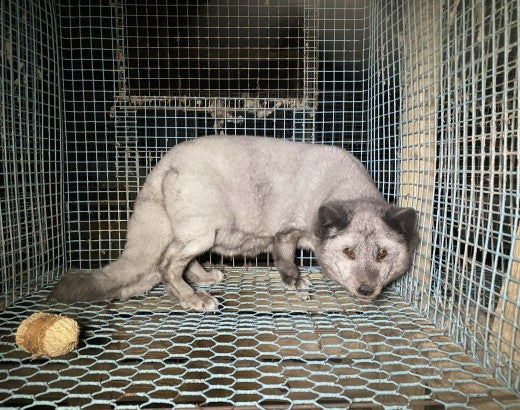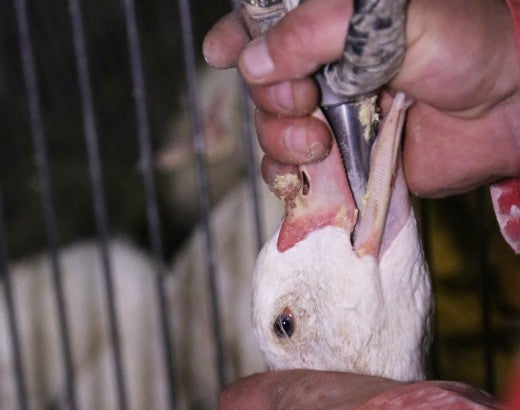Disturbing as it was to learn last week that the British government is wavering on proposed bans on imports of fur and foie gras, it was heartening to see the reaction of a caring public outraged by this news and the firm resistance of politicians determined to see these animal protection laws advance.
Such response is warranted because these two products represent animal cruelty at its absolute worst—unprincipled, unrestrained and indifferent to the misery and suffering. In such moments, public outcry and political resistance are not just measures of the progress we are making in our work. They are also very good measures of human decency.
According to reports, it was one of Prime Minister Boris Johnson’s Cabinet ministers, Jacob Rees-Mogg, who raised the flag of personal choice in defense of the two cruelties, suggesting that it is wrong for government to infringe on consumer freedom. At least two other ministers raised concerns about the bans, as well.
The proposed bans were intended to be part of the upcoming Animals Abroad Bill, framed to address the part the United Kingdom plays in the plight of animals suffering in other countries.
It is disheartening to see any officials at the highest levels of government settle on the argument that we should embrace consumer freedom as a blank check for some of the worst cruelties we could imagine, and some of the most avoidable. We’re talking, after all, about two products that represent the most unnecessary and extravagant consumerism: an ingredient that requires the pitiless force-feeding of ducks to swell their livers grossly, and a non-essential fashion material torn from the backs of wild animals.
We’re also talking, in both instances, about items that are illegal to produce in the U.K. precisely because of their cruelty. On top of that, polling suggests that 79% of the British public supports the foie gras sales ban and some 72% the fur sales ban. In a nation that has already made a clear moral judgment about these products, the consumer freedom argument seems especially feeble and out of touch.
A few Conservative Party politicians drew the same conclusion, and together with the country’s active Conservative lobby for animal welfare, they are communicating their dismay directly to the prime minister, the leader of their party. They’re encouraging Johnson to ignore the “minority of dissenters” seeking to scuttle the proposals, and they’ve warned him that there would be serious political costs were his government to backtrack. The government’s action plan for animal welfare discussed the problems of fur and foie gras, and the Conservative Party’s 2019 manifesto promised there would be no compromise on animal welfare standards in international trade.
Humane Society International/UK is working with Conservative and other members of Parliament to hold the government accountable to these commitments. HSI/UK launched the #FurFreeBritain campaign in 2017 and, as part of a coalition of likeminded organizations, is leading the campaign to secure a fur sales ban. In September, coalition partners delivered over 1 million petition signatures to the prime minister supporting a fur sales ban, and a host of compassionate celebrities have backed the effort. HSI/UK has also secured written support for a ban from 150 members of Parliament and peers of all political persuasions.
In every healthy society there are limits to personal choice, especially where such choice leads to the unconscionable suffering of others, something that people of all ideological persuasions understand and appreciate. In that regard, the fight over fur and foie gras in the U.K. has a universal relevance. And it certainly doesn’t make sense to accept imports of products that undermine or conflict with domestic animal protection standards. That’s why, in the United States, for example, we don’t allow the import of articles made from dog and cat fur, just as we don’t allow the sale of whale meat.
The argument in Britain is not an academic one. The lives of millions of animals are at stake. Since banning fur farming in 2000, the U.K. has imported over £800 million (more than $1 billion) worth of fur from countries in which foxes, mink, raccoon dogs and other fur-bearing species are trapped for their entire lives in the most barren and restrictive of cages before being gassed or electrocuted. As to foie gras, there may be as much as 200 tons of it imported from continental Europe every year.
We all value freedom of choice, but most of us comprehend that as a right that exists within a balanced framework of social good and common decency, and we understand that there is a limit to what can be justified in its name. When it comes to the practices at issue here—practices that involve the indisputable torment of animals—it’s pretty hard to see Rees-Mogg’s point. Fur and foie gras involve extreme forms of animal cruelty, shunned and stigmatized worldwide, and if the weak arguments marshaled against the proposed bans demonstrate anything, it is that fur and foie gras are, in the end, indefensible.
If you are a U.K. citizen, you can support the HSI campaign right now.



